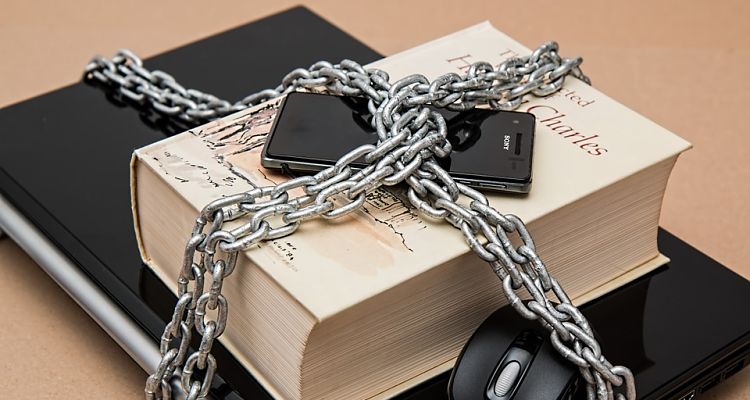
Computers and smartphones can remember passwords for quick access to a variety of accounts, and users may just enjoy the enhanced services with no worries. In order to reduce confusion, many people even use only one password for everything!
However, when relocating to a new home, this irresponsible attitude could prove to be exceedingly troublesome. Protecting your identity will likely be the last thing on your mind while you make the overwhelming relocation preparations. But you could pay a heavy price for this error in terms of resources like money, time, and anxiety. Therefore, if you’re unsure of how to prevent identity theft when moving, start with the fundamentals and then adhere to our supplementary tactical advice for effective fraud prevention.
The growing problem of identity theft
In today’s digital world, identity theft is a problem that is becoming more and more widespread. In addition to physical papers like credit card statements and bills, thieves can also obtain personal information by breaking into databases and using phishing scams. Once they obtain this information, they can use it to steal identities, start new credit accounts, and make unlawful transactions.
Identity theft can have terrible financial and emotional effects. It may take months or even years for victims to cleanse their names and restore their credit after going through this difficult process. In rare circumstances, they might even be responsible for erroneous loans or charges made in their name.
- According to Javelin Strategy & Research, 1 in 20 Americans were victims of identity fraud in 2020.
- The Insurance Information Institute reports that 33% of adults have experienced identity theft more than once.
- Cybersecurity Ventures predicts that cybercrime, including identity theft, will cost the world $6 trillion annually by 2021.
- The FTC received over 1.4 million reports of identity theft in 2020, double the number from 2019.
- According to a survey by The Harris Poll, nearly 60 million Americans have been affected by identity theft.
Secure your personal data from identity thieves
Securing your personal data from identity thieves is crucial both before and after moving. Your personal information may be used by thieves to open new credit accounts or even to steal your identity, which could result in significant financial loss. Here are some tips to keep in mind when moving to prevent identity theft:
Hire Dependable Movers
A crucial factor in preventing identity theft and preserving your personal information is hiring reliable movers. When you hire a moving company, you’re giving them access to your valuables and sensitive documents that are part of your personal property. You can make sure that your valuables are in good hands and that your personal information is protected by conducting your research and working with an established company.
While moving costs should be taken into account, it’s more important to choose a reliable moving company to protect your valuables and sensitive information. By working with a shady moving company, you run the danger of jeopardizing the security of your personal data. Invest in a trustworthy moving company to protect yourself from fraud and identity theft.
The Role of Insurance in Protecting Against Identity Theft
Insurance emerges as a beacon of hope, a safety net that cushions the blow of identity theft. It’s not just about the financial loss, but the painstaking process of restoring one’s identity and repairing credit reports. Insurance, in this context, is more than a mere contract; it’s a shield that guards your financial health during the tumultuous times of identity theft.
Fraud prevention is a multi-layered process, and insurance adds a crucial layer to it. It’s like a vigilant sentinel, always ready to step in when your personal data protection measures falter. It’s about secure relocation of your life’s earnings, your credit history, and your peace of mind. Investing in advanced theft protection services can add an extra layer of security, especially during the vulnerable time of moving. Remember, online safety is not just about strong passwords and secure networks; it’s also about having a robust plan B, and that’s where insurance comes into play.
Keep all necessary documents with you during the move
Identity theft is very prevalent and has been noted as one of the leading crimes in the country. According to reports from the Federal Trade Commission, close to 9 million Americans have become statistics of identity theft crimes. Transactions that you may conduct over the Internet may be subjected to an identity theft attack but did you know that it can also happen to you while you move house? It’s crucial to keep an eye on your credit cards, as they can be a goldmine for identity thieves.
Most people who move get in the habit of throwing away their documents before shredding them; others in a rush leave them behind for the landlords and their staff to dispose of them. When not disposed of properly, it becomes quite easy for the one stealing your identity to rummage through your dumped personal items and retrieve information that would help him succeed in his mission. Since these documents usually carry your personal information such as your social security number and bank account numbers etc., this puts you at a higher risk for identity theft.
Data and Facts
- The FBI’s Internet Crime Complaint Center reported that identity theft complaints surged by 69% in 2020.
- The average financial loss per identity theft incident was approximately $1,200 in 2020.
- The U.S. Postal Inspection Service states that mail theft is a common method used for identity theft.
- The National Cyber Security Alliance reports that 15% of people have received a notice by a business, bank, or card issuer that their personal information was compromised.
- The Federal Trade Commission (FTC) states that it takes an average of 6 months and 200 hours of work to recover from identity theft.
Don’t share your personal information, social security, and credit card information
Scammers may try to take advantage of the stress of moving by tricking you into giving them your personal information. Unwanted phone calls, emails, or text messages are just a few of the many ways that these scams can be perpetrated. For the purpose of gaining your trust and access to your personal information, con artists may take the form of moving companies, utility companies, or other respectable businesses.
It’s critical to exercise caution and skepticism while responding to unwanted communication in order to protect yourself from scammers. Never disclose personal information over the phone or over email unless you are convinced that it is necessary. Never provide your social security number or financial information unless you are certain that doing so is secure. Always confirm the identity of the person or organization before providing any information.
- The IRS warns that identity thieves also target tax records.
- The Social Security Administration has a dedicated online reporting form for identity theft.
- The U.S. Department of Justice recommends freezing your credit as a proactive measure.
- The American Bankers Association suggests setting up account alerts for suspicious activities.
- The National Institute of Standards and Technology (NIST) recommends using a passphrase instead of a password for better security.
Don’t throw documents in the dumpster
How to handle the collection of paperwork marked as outdated. You don’t want to incur additional costs for moving a bulky load of pointless paperwork. So, throw it out, but take care! What is no longer valuable to you can be precious to someone else! There is a lot of private information printed on old documents; old bank statements, invoices, warranties, etc. may even contain your credit card number, contact information, and other personal information.
Con artists can simply commit fraud and remove your money or violate your rights if they have this information (like medical insurance or membership in a certain organization). The possible challenges go beyond only money-related ones.
Shred unneeded documents
When moving, shredding unnecessary paperwork is an important phase in preventing identity theft. Your trash is a convenient place for criminals to search for sensitive data like credit card numbers, bank account information, and social security numbers. You make it far more difficult for them to get this information and take your identity by trashing these documents.
Thankfully, there are ways you can protect yourself from identity theft before you move to a new house and we have a few ways this can be done. Foremost, it would be wise for you to invest in a home office shredder.
These shredders usually retail for $40 and upwards, but are truly a good investment, especially when you consider how much it would save you in the long run. Even as you relocate the documents that you intend to keep, you also need to make sure that they are safely secured so that you would not lose some of these important documents.
Organize important documents
One way you can secure these documents is to purchase one of those accordion folders where the front folds over and then is secured with a string. These folders are available in both paper and plastic materials. If you use a paper file, place the folder in a plastic bag so that it will not be ruined if exposed to liquid. A fire-proof box is also a great place for storing your personal documents as well. Documents such as these should never be loaded on a moving truck. Never leave your social security card unattended during the move, as it’s one of the most targeted items for identity theft. The last thing you need is for the movers to mishandle your document folders which could result in you losing a few documents here and there.
Your best bet would be to transport the items yourself in your vehicle. One of the most effective ways to protect your identity during a move is to use secure methods for transporting your important documents. Or you can leave your items with a relative that you trust who would be able to mail the documents to you as soon as you settle in your new home. However, if you have a lot of documents that are too costly to ship out and you have no choice but to send them with the movers, then you may want to invest in a filing cabinet that features a strong padlock. Even after you move it is very common that some of your mail would go to the old address.
Protect your online information
The practice of keeping critical documents in digital format has recently taken hold. Computer data and records literally hold your life, from the adorable photos of your kids that you wouldn’t risk losing for anything in the world to your social security number and bank accounts at the end. Therefore, on a moving day, block any access to your electronic gadgets.
They should be kept apart and inaccessible to curious movers, nosy neighbors, or even your freewheeling children. It is not a good idea to give your electronic equipment to a moving firm. Foremost, it is very delicate, and if it is broken, the replacement would be very expensive. Therefore, giving your laptop or external storage device to a complete stranger is never a good idea. You should bring all portable electronic devices, such as smartphones and tablets, with you.
Digital Security Measures
In the digital age, protecting your personal information is paramount. It’s not just about physical documents anymore; our lives are increasingly online, and so are our vulnerabilities. Digital security measures are no longer optional; they are a necessity. Let’s delve into some of these measures that can fortify your digital fortress.
Firstly, the strength of your defense often lies in the complexity of your passwords. A strong, unique password acts as a formidable gatekeeper, deterring unauthorized access. It’s like the lock on your front door, but for your digital house. Remember, the more intricate and unique your password, the harder it is for identity thieves to pick the lock.
Secondly, consider enabling two-factor authentication (2FA) on your accounts. This adds an extra layer of security, requiring not only your password but also a second piece of information only you would have access to. It’s like a security guard asking for ID after you’ve entered your key. This way, even if someone manages to guess your password, they’d still need this second piece of information to gain access.
Lastly, secure your Wi-Fi networks. An unsecured Wi-Fi network is like leaving your windows open while you’re away. Anyone can peek in. By securing your network, you’re pulling the blinds shut, keeping your personal information out of sight from prying eyes.
Remember, these steps are not exhaustive. fraud prevention is an ongoing process, and credit report monitoring is an essential part of this. Regularly checking your credit reports can help you spot any suspicious activity early, allowing you to take swift action. Consider subscribing to a reputable identity theft protection service that monitors your financial activities and alerts you of any irregularities.
In conclusion, online information protection is a shared responsibility. It’s about being vigilant and proactive, taking the necessary steps to protect your digital identity, especially when moving. After all, your digital security is just as important as the security of your new home.
Forward Your Mail
It should go without saying, but after changing your address with the US Postal Service, try to get in touch with everyone who is sending you mail, and be sure to let them know your new address. If not, important mail might never get to you. It might be carelessly thrown away, giving an identity thief looking for such an opportunity unintentional access.
Talk with the new occupants of your prior home, nevertheless, to be certain you won’t lose anything delivered to your old address. Ask them to send any mail addressed to you to your new address and explain the situation. Don’t forget to leave them some cash to cover their costs.
Make sure that you keep an eye on this, as some of your most vital correspondence can get rerouted to the old home. Similarly, check with all your utility companies and other companies you may have subscribed to, to ensure that all your accounts are closed at the previous address. This is to prevent any reopening of your account under false pretenses.
Check your credit report
Months after you move, you should also keep track of your credit report, looking out for sudden changes that could be a result of identity theft. If there is a discrepancy in your report, you should immediately notify the credit bureau, which would then attach a fraud alert to your account. Regularly communicating with credit bureaus can help you monitor any suspicious activities on your accounts.
Each of the three major credit reporting companies (Equifax, Experian, and TransUnion) offers a free credit report once a year. Look carefully over your report for any accounts or charges that you don’t recognize. If you do uncover anything suspicious, you can dispute the information with the credit reporting agency and take precautions to avoid identity theft in the future.
You can help safeguard yourself from identity thieves and fraud by being watchful for scams while relocating. Avoid letting con artists exploit you at an already difficult time. Always be watchful and safeguard your personal data. Be cautious about sharing your moving plans on social media, as you never know who might be watching.
The Legal Aspects of Identity Theft
Understanding the legal consequences associated with identity theft is crucial for comprehending the gravity of this issue and the available legal options for those affected. When confronted with identity theft, it is imperative to promptly notify law enforcement authorities. Get in touch with your local police department or use the non-emergency number to initiate a police report. It is highly beneficial to provide substantial evidence and documentation, such as copies of fraudulent transactions or unauthorized account access, to support the ongoing investigation.
Apart from reporting the incident to law enforcement, victims should also take immediate steps to challenge any unauthorized charges or accounts established under their name. Contact your bank, credit card companies, and other relevant financial institutions to inform them about the identity theft. They will assist you in navigating the process of disputing the charges and, if necessary, guide you in closing compromised accounts to prevent further harm.
- The U.S. Department of Justice advises keeping a record of all conversations and correspondence concerning the theft.
- The Identity Theft Resource Center offers free victim assistance and educational materials.
- The Cybersecurity and Infrastructure Security Agency (CISA) provides guidelines on securing Internet-connected devices.
- The Federal Reserve suggests that you monitor not just your credit report but also your bank statements and transactions.
- The Better Business Bureau recommends checking the credentials of your moving company with them to ensure reliability.





Leave a Comment